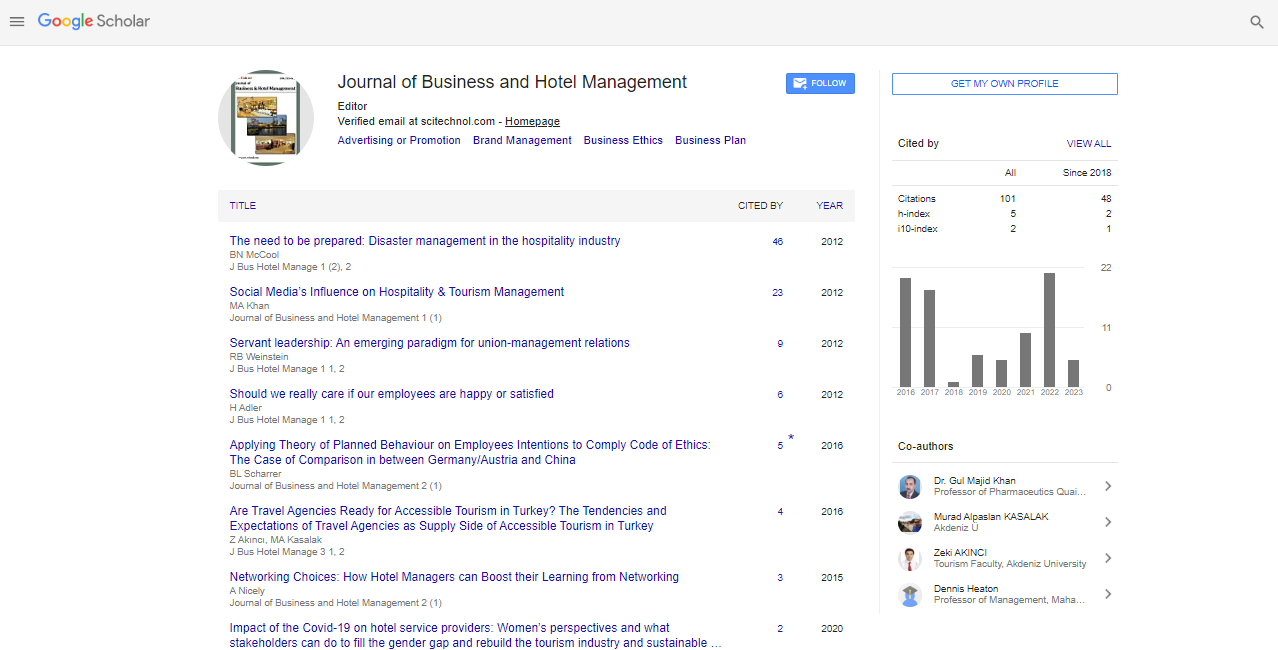Opinion Article, Jbhm Vol: 9 Issue: 3
Crafting Success: Strategic Marketing in Hotel Management
Jim Lu Hung*
Department of Business Administration, The Hong Kong Polytechnic University, 17 Science Museum Road, TST East, Kowloon, Hong Kong
*Corresponding Author: Jim Lu Hung
Department of Business Administration, The Hong Kong Polytechnic University, 17
Science Museum Road, TST East, Kowloon, Hong Kong
E-mail: Jimluhung387@gmail.com
Received date: 28 August, 2023, Manuscript No. JBHM-23-117774;
Editor assigned date: 30 August, 2023, PreQC No. JBHM-23-117774 (PQ);
Reviewed date: 13 September, 2023, QC No. JBHM-23-117774;
Revised date: 21 September, 2023, Manuscript No. JBHM-23-117774 (R);
Published date: 29 September, 2023, DOI: 10.4172/2324-9129.1000145
Citation: Hung JL (2023) Crafting Success: Strategic Marketing in Hotel Management. JBHM 9:3.
Description
In the dynamic and competitive world of hotel management, effective marketing strategies are paramount. A well-crafted marketing plan not only attracts guests but also enhances the brand, fosters customer loyalty, and ensures the hotel's sustained success. This essay explores the key elements of marketing strategy in hotel management, shedding light on how hotels leverage innovative techniques to reach their target audience, produce compelling brand narratives, and provide exceptional guest experiences.
Understanding the market and guests
The foundation of any successful marketing strategy lies in understanding the market and the guests' needs and preferences. Hotels conduct market study to identify trends, analyze competitors, and gauge customer expectations. By comprehending the demographics, psychographics, and behaviors of their target audience, hotels can tailor their services and promotions effectively. Understanding the market dynamics enables hotels to anticipate changes and adapt swiftly, ensuring they stay ahead in the competitive landscape.
Online presence and digital marketing
In the digital age, a robust online presence is non-negotiable. Hotels invest in user-friendly, visually appealing websites that provide comprehensive information about their offerings. Search Engine Optimization (SEO) techniques enhance the visibility of the hotel's website, ensuring it appears prominently in search engine results. Social media platforms are powerful tools for engagement and brand building. Engaging content, interactive posts, and timely responses to customer inquiries foster a sense of community and loyalty among online followers.
Personalized marketing and guest experience
Personalization is the cornerstone of modern marketing strategies in hotel management. Hotels collect guest data to produce personalized experiences. By analyzing guest preferences and behavior, hotels can offer tailored recommendations, exclusive offers, and customized services. Personalized communication, both before and after the guest's stay, demonstrates a hotel's commitment to individual guests, enhancing their sense of value and satisfaction. From welcome notes with personalized amenities to post-stay feedback requests, every interaction is an opportunity to strengthen the guest's bond with the hotel.
Collaborations and partnerships
Collaborations and partnerships can significantly amplify a hotel's marketing reach. Hotels often collaborate with local businesses, event organizers, or travel agencies to cross-promote services. Partnering with influencers or celebrities can also produce buzz around the hotel, reaching a broader audience. Loyalty programs and affiliations with travel platforms provide incentives to repeat guests and attract new ones. These collaborations not only enhance the hotel's visibility but also introduce the hotel to new market segments, driving revenue and brand recognition.
Quality content and storytelling
Compelling storytelling is a potent marketing tool in hotel management. Hotels craft narratives that evoke emotions and resonate with their target audience. Quality content, including blogs, videos, and social media posts, showcase the hotel's unique features, local attractions, and guest experiences. By telling authentic, engaging stories, hotels generate an emotional connection with potential guests, inspiring them to choose the hotel for their stay. Stories about the hotel's history, sustainability efforts, or community engagement initiatives contribute to a positive brand image, influencing guests' perceptions and decisions.
Continuous evaluation and adaptation
The effectiveness of any marketing strategy lies in its ability to adapt to changing market trends and guest expectations. Hotels employ analytical tools to measure the performance of their marketing initiatives. Metrics such as website traffic, conversion rates, social media engagement, and customer feedback are analyzed to assess the impact of marketing efforts. Based on these insights, hotels refine their strategies, reallocating resources to the most effective channels and approaches. Continuous evaluation and adaptation ensure that the hotel's marketing efforts remain relevant and yield maximum returns on investment.
Conclusion
In conclusion, strategic marketing in hotel management is a multifaceted endeavor that requires a deep understanding of the market, guests, and evolving industry trends. Successful hotels leverage their knowledge to generate powerful online presences, personalized experiences, meaningful collaborations, compelling narratives, and adaptive strategies. By aligning these elements cohesively, hotels not only attract guests but also cultivate lasting relationships, fostering loyalty and positive word-of-mouth. In the ever-evolving landscape of hospitality, hotels that invest in strategic marketing not only thrive in the present but also pave the way for a sustainable and prosperous future, ensuring their place as industry leaders and guest favorites.
 Spanish
Spanish  Chinese
Chinese  Russian
Russian  German
German  French
French  Japanese
Japanese  Portuguese
Portuguese  Hindi
Hindi 